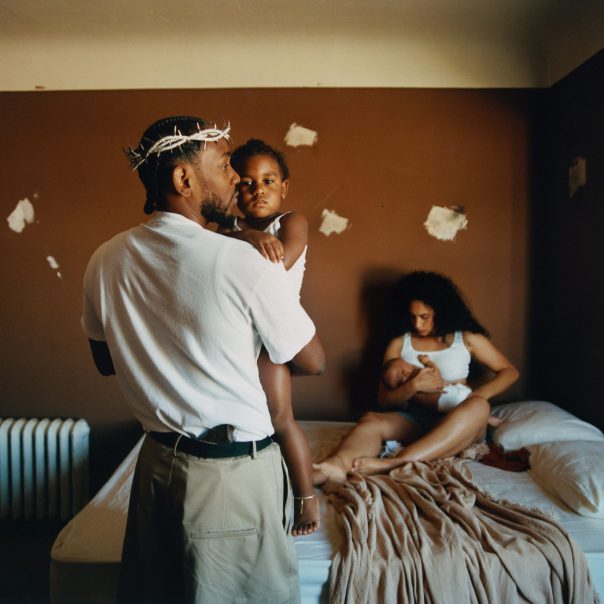REVIEW: Kendrick Lamar finds his center on ‘Mr. Morale & The Big Steppers’

Kendrick Lamar, “Mr. Morale & The Big Steppers.”
To think that it’s been five years since the world has heard a new project from Compton’s Kendrick Lamar. Fans have been desperate to hear new work from K-Dot, who in the last few years has collaborated on Marvel’s “Black Panther” soundtrack, and performed at this year’s Super Bowl halftime show. The silence was broken with “The Heart Part 5,” which led up to the highly anticipated Mr. Morale & The Big Steppers.
Mr. Morale & The Big Steppers
Kendrick Lamar
Top Dawg Ent., May 13
9/10
His fifth album is also his final with longtime label Top Dawg Entertainment, leading many to speculate what Kendrick’s future career moves may lead him toward. The album’s 18 tracks are split in a double format, giving listeners plenty of time to soak in the jazz influences and introspective lyricism as Lamar opens up about the deeper psychological issues that have manifested and festered in his mind, contrasted with the significant sociopolitical issues that have plagued the country for the last few years.
It opens with “United In Grief” as harmonized vocals lead into piano key strikes in an unsettling pattern, followed by hi-hats, snares and a brighter jazz melody. A beat switch follows midway. Strings swell with synth tones and Lamar raps about his mental health and how wealth has served as an easy source of relief to cope. “I grieve different,” he raps. A playful singing intro leads into scratchy snares and synth’s straight out of an E-40 song from the aughts on “N95.” Kendrick speaks about how sociopolitical unrest has forced people to grapple with the true essence of their character.
“Worldwide Steppers” kicks off with the clicking of tap dance shoes, a motif repeated throughout the album. A fuzzy bass strum carries the song. Kendrick opens speaking about the significance his family and his daughter hold in his life, followed by his frustrations with writer’s block as he attempts to channel God himself through the verse.
Blxst and Amanda Reifer make an appearance on “Die Hard.” A swinging jazz melody of flute, bass, light piano and claps color this gorgeous number. Kendrick raps about how he’s struggling to open up to those around him, only to reveal his deep-seated fears about family, money and the trauma that lingers from the violence he witnessed in his youth.
“Father Time” and “We Can Try Together” both hit listeners with an uncomfortable glimpse into the uglier side of Kendrick’s psyche. The former explores Lamar’s relationship with his father through thick and thin, examining the toxic masculinity that made things hard, contrasted with the lessons grit and fortitude that helped build him into the man he is today. The latter recalls “u” from To Pimp a Butterfly, where we witness firsthand an argument between Kendrick and his wife—portrayed by actress Taylour Paige.
“Purple Hearts” starts off with Lamar rapping about how his stardom and celebrity have ironically led him to become distant from other artists around him. He’s joined by Summer Walker, who sings about what it takes to build a loving relationship, and Wu-Tang’s Ghostface Killah, as he laments the collapsing state of the world.
We then get into the deeply self-aware “Crown.” Kendrick reflects on how his artistry and character cannot please everyone—despite how it seems everybody loves Lamar. The steady rocking between two piano keys illustrate this feeling of walking a tightrope while Kendrick precariously navigates this dilemma he’s facing.
“Silent Hill” is not a nod to the video games of the same name. Kendrick brings on Kodak Black, who features throughout the album doing ad-libs and providing primary vocals on “Rich-Interlude.” Lamar reflects on how distant and distrustful he’s become of others around him who are after his money, while Kodak raps about navigating the game with little support.
Lamar’s cousin Baby Keem goes off on “Savior-Interlude,” on which he raps about the trauma and brutality he witnessed firsthand while growing up. Kendrick follows suit on “Savior.” He explores his place as a Black icon and how his celebrity impacts society and politics, reflecting on his response to the BLM protests of 2020 and the COVID-19 pandemic. Kendrick seems to insist on his imperfections, proclaiming that he’s no savior.
The thumping kick drum and light synths of “Aunties Diaries” builds while Kendrick openly voices his support for trans rights. The song is about his two trans family members. “Mr. Morale” and “Mother I Sober” are the heaviest cuts on the album. Both explore childhood abuse and trauma that have affected Lamar, the people in his family and many others in Black communities—and how heavy the burden of grappling with it all can be.
Mr. Morale & The Big Steppers does close out on a slightly brighter note with “Mirror.” Kendrick raps about how he both wants and needs to choose his own wellbeing, to work on himself and to get to a healthier place.
Follow editor Tim Hoffman at Twitter.com/hipsterp0tamus.
